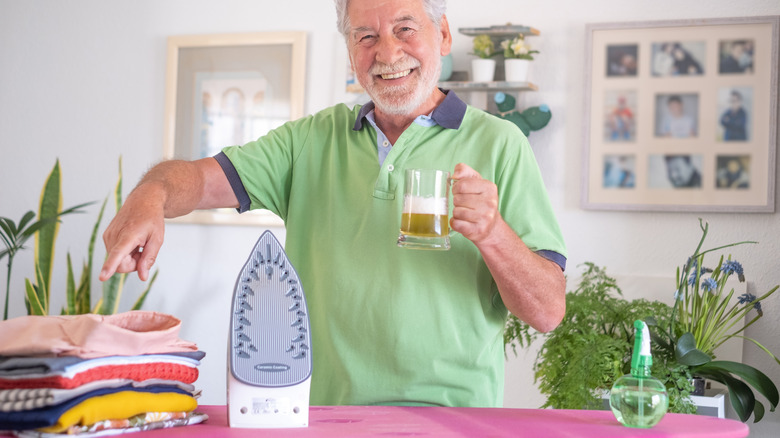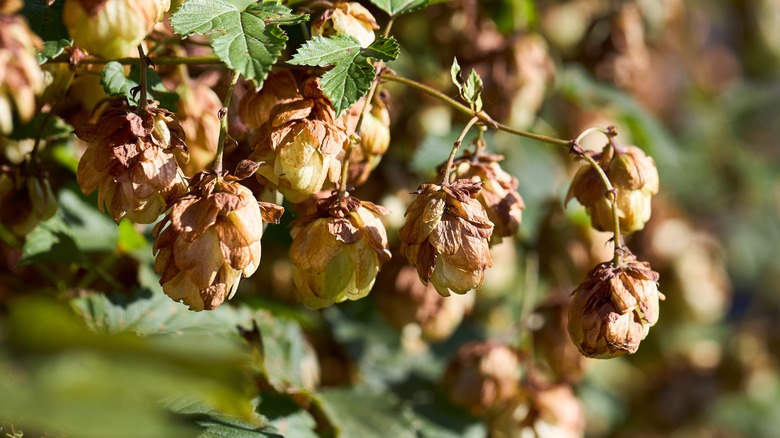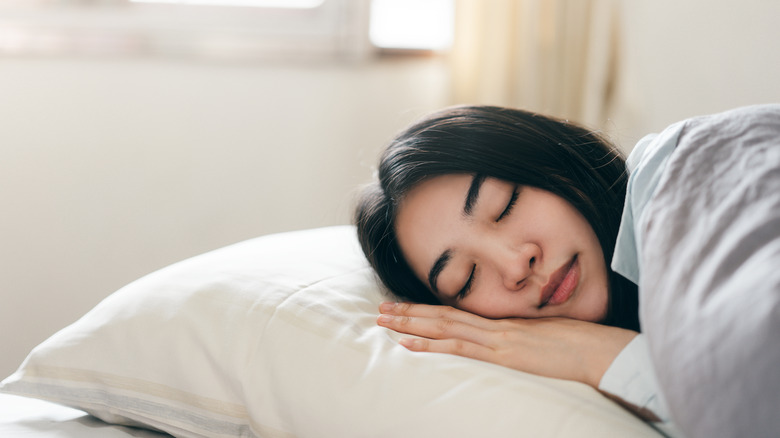The Unexpected Reason Why People Are Washing Their Pillowcases With IPA Beer
Beer has so many more uses than just downing a cold can on a hot summer's evening. Use it to wash your hair, remove stains, make copper shine like new, or ... help you get to sleep. That's right; washing your pillowcases or other bed linens in IPA beer is purported to send you off to dreamland quicker. It turns out that hops — the abundant vine that gives beer its distinctive bitter taste — contain the acidic compounds humulone and lupulone, which increase GABA activity and slow down our central nervous system.
In 2016, the European Medicines Agency approved hop extracts — called strobiles — for use in sleep aids, and now, some American farmers are putting resources into hop production and looking to capitalize on sleep-aid manufacturing among other growing markets. Hops, or more precisely, the flowers of the hop plant (Humulus lupulus), are made into teas and supplemental powders, often combined with valerian and sometimes also passionflower, a mixture aptly named the "Three Sisters of Sleep."
While it's true that hops contain sleep-inducing compounds, whether dosing your bedding in beer will help you drift off more easily is another matter altogether. While most — honestly, probably all — of the evidence for the scent of beer being a sleep aid is anecdotal, there's certainly no harm in testing the idea out for yourself.
It's all in the hops
Recent research points to the consumption of beer made with hops — even non-alcoholic beer — affecting sleepiness. For example, a 2012 PLoS One study of nurses (a notoriously sleep-deprived population) found that drinking 333 milliliters of 0% beer with dinner improved nighttime sleep quality. An experiment where quails were given 2 milligrams of hop extract, published the same year in Acta Physiologica Hungarica, resulted in quieter brain activity during sleep.
You're probably not licking your pillowcase in your sleep (at least, not consciously), so the premise in this case — that washing your pillowcase in beer to promote sleep — would be that it's the aroma rather than the consumption of said beer that makes you tired. It's an idea that goes back centuries. Farmworkers in Europe appeared sleepier harvesting hops than other crops despite the same workload. Modern hop-growing experts Laura Ten Eyck and Dietrich Gehring reported feeling lethargic when picking balls in their 2016 guide "The Hop Grower's Handbook." Was it due to the scent of the fresh-picked hops in both cases? In the U.K. and America of centuries past, it was traditional to load hops into your pillows, mattresses, or specially-made "sleep bags" to improve shut-eye. It's a practice still recommended today — alone or combined with other herbs like lavender. You can even visit beer spas for a bath in beer, which the salons claim will help you meet your restful slumber goals.
Pour your pillowcase a pint
To test the theory for yourself, buy the hoppiest beer you can find — an IPA or maybe a pale ale. Advice on how much to add to your machine or tub of water (if you're hand-washing) ranges from a splash of beer to a 1:1 ratio of beer to water. Letting the beer go stale first is also up for debate. Wash the pillowcase in the mixture and dry it on the line or in your dryer. We suggest trying this idea for the first time with your least-fancy pillowcase in case things go awry.
Not interested in becoming a sleep scientist? Repurpose an unwanted pillowcase by stuffing it with store-bought dried hops, or buy pre-stuffed pillows and other hop-scented sleep aids. Hoppy Dreams Sleep Company in Brevard, NC, sells alpaca-fleece pillows stuffed with hops for $149 at the time of writing. Meanwhile, a 2.5-fluid-ounce bottle of the hops-containing & Now To Sleep Pillow Spray by Ren Clean Skincare costs $29. If you live in USDA Hardiness Zones 4 to 9, you could even grow a hop vine fence and dry the flowers yourself. Promising outcomes from a 2021 study published in Molecules of the plant's effect on GABAA receptors in mice suggest Saaz and Saphir hop vine cultivars are a good choice for snooze-deprived home gardeners.


